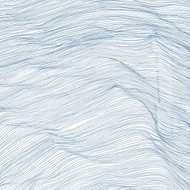Collaboration Between Jazz Legends on 180g Clear Vinyl LP!
Two Centuries is the first recorded collaboration between jazz legends Wadada Leo Smith and Andrew Cyrille, with rising electronic experimentalist, composer, and drummer Qasim Naqvi.
The album was instigated by Red Hook Records founder Sun Chung (who at the time was Cyrille's producer for ECM Records) and Naqvi, who recalls; "Sun wanted to talk about a possible album project with Andrew and myself on synthesizers. This was an incredible proposition, as Andrew was one of my first professors at the New School back in the 90s and I've idolized his playing since. Blending his approach on the drums with mine on a modular synthesizer felt like an unprecedented musical opportunity. We also discussed the possibility of a third member and Wadada instantly came to mind. It was especially meaningful because Wadada was also a teacher of mine, in the early noughties when I was a graduate student at CalArts. Beyond their wisdom as musicians, the idea of creating something with two teachers who's spanned the end of one century and the beginning of another felt important."
Traditional and electronic instruments have combined in jazz countless times, but Two Centuries stands out as unique and fresh. Each of the trio gels with one another, but also stands out independently, with three very distinct voices cutting through un-obstructed. Cyrille and Smith's ability to harmonize with what are, at points, abstract, alien electronic sounds, is testament to both their innate musicianship and maintained desire to innovate – something which was mindfully facilitated by Naqvi. "They're both such masters of sensitivity and restraint and so compositional in how they improvise. I wanted to create a system on the synthesizer that complemented these strengths. The modular, conversely, can be so kaleidoscopic in its expression. It's also a little unstable in its tuning and mechanics. With that said, the machine's instabilities help make it more human. It provided some fallibility and made things unpredictable and ultimately organic within this trio context." He adds, "Andrew and Wadada have lived such long and creative lives and I wanted this album to embrace where they're at now. It would have been a grave mistake to lay some stuff on them that wasn't intrinsic to them at this moment". When writing the music, Naqvi hoped to craft lines that were uncomplicated, giving each instrument ample space. Some of the melodies were notated, while others improvised.
Naqvi's electronics, Smith's trumpet and Cyrille's percussion acquiesce with finesse in a perfect simpatico balance of accommodating and complimentary interplay. The trio balance bursts of energy with delicate stillness to create a feeling of meditation. Nuanced, textural, subtle yet devastatingly affective as well as sensitive and contemplative where appropriate, they also deliver bursts of incredible energy and impact; navigating a path between expressions of dismay and meditative healing resolutions – both a protest and paean for harmony.
The album's opening track, "For D.F," was written for Darnella Frazier, the young woman who recorded the murder of George Floyd. Here, the trio's music is slow and wavering, tinted by forlorn feelings woven into chilling melodies. "During that year and a half of writing, millions of people died all over the world and America felt like it was deteriorating on a whole other level. The murder of George Floyd and the palpable unravelling of America beyond the pandemic, felt profound", comments Naqvi. "I didn't want to make a political album but it was hard to not be creatively effected in some ways by such a perilous moment. This was an extraordinary time and there are moments on the record that reflect that." From there, "The Curve" immediately takes a new direction, spiralling through staticky, electric tones and spontaneous rhythms. It's a slow build, simmering as it blooms from mellow synth melodies and frenetic percussion, matching a variety of different textures into one complete package.
With almost-acid pips, "Spiritual is 150" recalls the slow birth, unfurling geneses evident on Naqvi's last full longplayer "Teenages" (2019), whilst the revving, withheld energy "Bypass Decay," sounds like a buildup of voltage stored to bursting point. Elsewhere, the playful, spasmodic bossa-ish shuffle of "Palaver," is bass heavy and more overtly electronic, whereas the gnarly electronic funk of "Sadden Upbeat," is a fierce dual between Naqvi on both modular synth and drums and Smith's layered trumpet.
The album returns to its meditative core across the final tracks, rounding out its sound in a near-perfect circle. On "Wraith," a slow, sunrise-like bed of synthesizers and a distant drum shuffle set the stage for a graceful melody in the trumpet. The feeling is that of a new dawn, but a dawn that's undeniably marked by the darkness of the night before, while the finale, "Orion Arm," signals the album at its most pensive. Smith's trumpet echoes as if it's trapped in time, humming above stillness with emphatic repetition. Here, the trumpet takes centre stage, driving the music's sense of reflection, nostalgia, and poignancy. The sound is thoughtful, highlighting the running undercurrent of intuition that makes the album feel so seamless.
At its core, it's this willingness to sit in gentle contemplation that makes Two Centuries reach its highest pinnacles. Teetering between revelation and precariousness, it's here where these musicians find radiance.
...feels like an exquisite port in a storm.
"Killer!"
Exquisitely constructed…They are not landscapes to be admired at a distance, but inscapes to be explored with attentive care.
...a significant avant highlight in 2022 landing post abstract expressionist in a serene oasis of sound
Two Centuries is solace for the soul.
The album is a masterful study in texture and contrast.
Features
- 180g Vinyl
- Clear Vinyl
- Recorded May 21-23, 2001 at The Bunker Studio in Brooklyn, NY
- Made in the EU
Musicians
| Qasim Naqvi | modular & Minimoog synthesizer, drums (tracks 6,8) |
|---|---|
| Wadada Leo Smith | trumpet |
| Andrew Cyrille | drums |
Selections
Side A:
- For D.F.
- The Curve
- Spiritual is 150
- Organum
- Tympanic
Side B:
- Bypass Decay
- Palaver
- Sadden Upbeat
- Wraith
- Halide
- Orion Arm



 Turntable Accessories
Turntable Accessories Headphone Accessories
Headphone Accessories Cable Accessories
Cable Accessories Vinyl Accessories
Vinyl Accessories Compact Disc Accessories
Compact Disc Accessories









